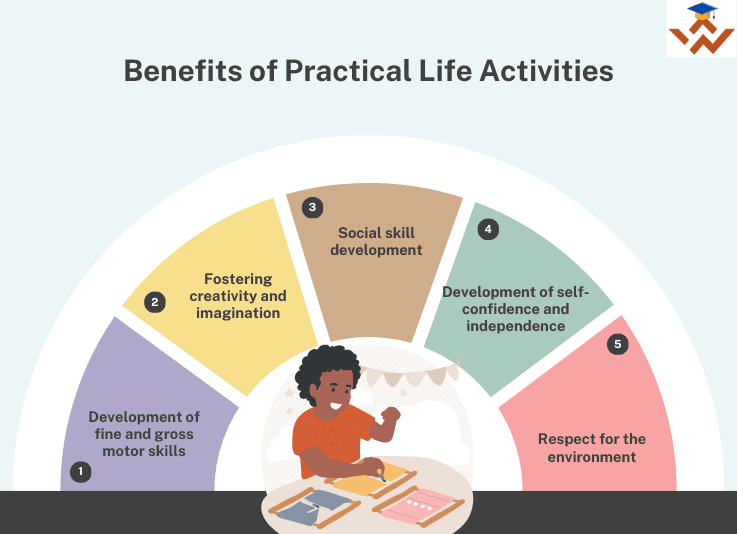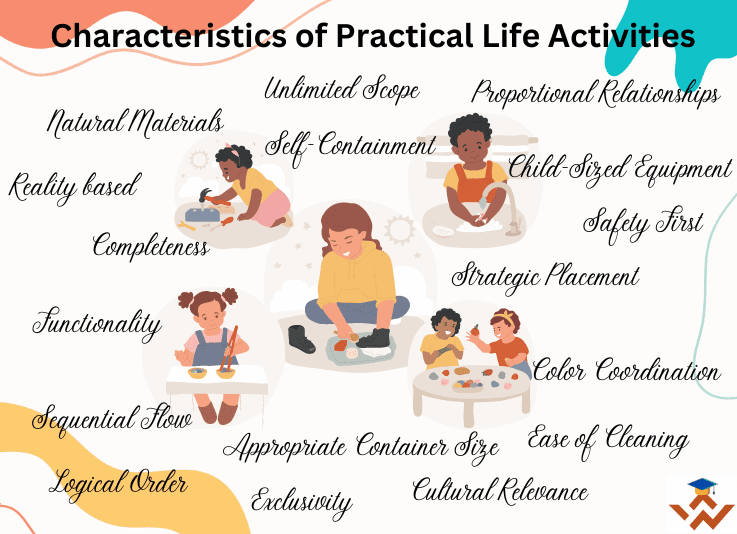In today’s world, technology is becoming increasingly prevalent and accessible, and children are introduced to it at a much younger age than ever before. With this in mind, it is imperative that we teach children practical life skills through hands-on Montessori practical life activities that they can do at home. This not only helps develop their independence and sense of confidence, but also prepares them for real-world situations they may encounter in the future.
What are Montessori Practical Life Activities?
Montessori Practical Life Activities are an important component of the Montessori Method, which emphasizes independent learning and exploration. These activities are designed to help children develop skills such as independence, coordination, concentration, and orderliness, by focusing on everyday life skills that children learn through hands-on experience. The purpose of these activities is to develop children’s fine and gross motor skills, foster their creativity and imagination, and develop their social skills. Montessori Practical Life Activities provide children with a well-rounded set of skills and experiences that helps them develop into independent, responsible, and empathetic individuals.
What is the Purpose of Practical Life Activities?
- The purpose of Montessori Practical Life Activities is to develop children’s fine and gross motor skills, which are crucial for later academic success. These activities help children acquire the necessary hand-eye coordination, fine motor skills, and concentration that are required to perform daily tasks such as writing, drawing, and reading. By performing these activities, children develop their self-confidence, independence, and responsibility.
- Another aim of Montessori Practical Life Activities is to foster children’s creativity and imagination. Through these activities, children are encouraged to come up with their own solutions to everyday problems, which helps them develop their problem-solving skills. This not only supports their cognitive development but also helps them develop a sense of autonomy and self-reliance.
- In addition, Montessori Practical Life Activities are an excellent way to develop children’s social skills. Children learn how to work together cooperatively, share materials, and take turns. These activities also help children develop their sense of empathy and understanding of other people’s perspectives.
Montessori Practical Life Activities are an essential part of the Montessori curriculum, providing children with a solid foundation for academic success and personal growth. These activities are fun, engaging, and rewarding, encouraging children to explore the world around them while developing their skills.
Also Check: 20 Montessori Practical Life Activities that can be Setup at Home
What are the Different Areas Practical Life Activities Cover?
Montessori Practical Life Activities encompass a wide range of everyday skills that children learn through hands-on experience. These skills can be divided into several categories, including:
- Care of self: These activities include tasks such as washing hands, brushing teeth, and dressing oneself, which help children develop independence and self-care skills.
- Care of the environment: These activities focus on tasks such as cleaning, sweeping, and gardening, which helps children develop responsibility and respect for their environment.
- Grace and courtesy: These activities include tasks such as greeting others, saying please and thank you, and using good manners, which help children develop social skills and empathy.
- Movement: These activities focus on developing children’s gross motor skills, such as walking, jumping, and climbing, as well as their fine motor skills, such as pouring, spooning, and transferring objects.
- Sensorial: These activities focus on developing children’s senses, including their senses of touch, taste, smell, sight, and hearing. Examples of sensorial activities include matching sounds, sorting colors, and identifying different textures.
What are the Benefits of Practical Life Activities?
Montessori Practical Life Activities provide children with a wide range of benefits that help them develop into well-rounded individuals. These benefits include:
- Development of fine and gross motor skills: Through tasks such as pouring, spooning, and transferring objects, children develop their hand-eye coordination, fine motor skills, and concentration. These skills are essential for later academic success, as they are required for tasks such as writing, drawing, and reading.
- Fostering creativity and imagination: By encouraging children to come up with their own solutions to everyday problems, Montessori Practical Life Activities help children develop their problem-solving skills and foster their creativity and imagination. This not only supports their cognitive development but also helps them develop a sense of autonomy and self-reliance.
- Social skill development: Montessori Practical Life Activities allow children to work together cooperatively, share materials, and take turns. These activities also help children develop their sense of empathy and understanding of other people’s perspectives.
- Development of self-confidence and independence: Through tasks such as washing hands, brushing teeth, and dressing oneself, children develop independence and self-care skills. They also learn to take responsibility for their own actions and develop a sense of self-confidence.
- Respect for the environment: Montessori Practical Life Activities focus on cleaning, sweeping, and gardening, which helps children develop responsibility and respect for their environment.
What are the Characteristics of Practical Life Exercises?
As someone deeply involved in the Montessori method, I’ve observed several key characteristics of practical life exercises that are crucial for effective learning and development in children. Here are my insights that make practical life activities a must try:
- Reality-Based: Montessori activities mirror real-life tasks. Children engage in authentic experiences like washing dishes using actual soapy water, shining shoes with real polish, and slicing fruit with a genuine knife. This approach not only teaches practical skills but also ensures safety through real-world applications.
- Unlimited Scope: Contrary to common belief, practical life activities aren’t confined to predefined tasks. They are endlessly versatile, adapting to the diverse cultural and environmental contexts of different communities and countries. Creative adaptation within the theoretical framework of Montessori allows for the development of unique activities.
- Exclusivity: In our Montessori environment, we maintain only one instance of each activity. This limitation teaches children patience and the value of delayed gratification. It also elevates the importance of the materials, though backups are kept for replacements as needed.
- Self-Containment: Each activity is neatly organized in a basket, tray, or designated space, complete with all necessary materials. It’s my responsibility to ensure these are fully prepared for the children, supporting their need for order and aiding in their internalization of organizational skills.
- Completeness: Every activity is comprehensive. If an element is used up or needs replenishing, I show the children how to restock. Any incomplete, broken, or missing components are either fixed by me or removed from the environment.
- Strategic Placement: We arrange materials based on their category – food-related activities are in the preparation area, self-care items are in their designated space, and so forth. Locating water activities near a water source, for example, enhances the practicality of these exercises.
- Sequential Flow: Each activity is structured with a clear beginning, middle, and end. An example is the use of aprons – when a child dons an apron, it signals the start of an activity, a practice I also follow.
- Color Coordination: Items within an activity are color-coded for easy identification and organization. This aids in teaching children to recognize and match items, enhancing their cognitive skills.
- Appropriate Container Size: Containers are selected based on their suitability for child handling. They’re adequately sized to secure contents, preventing spillage during transport.
- Functionality: All materials serve a specific, functional purpose. A non-functional utensil, like a blunt knife, is avoided as it can lead to misuse or frustration. We ensure that each tool is effective and appropriate for the child’s capabilities.
- Child-Sized Equipment: Every item, from a sponge to a brush, is scaled to fit comfortably in a child’s hand, ensuring successful use.
- Proportional Relationships: Items within an activity are proportionally sized to each other and functional. For example, a bucket used in a cleaning exercise must be manageable for a child to carry, yet large enough to hold the necessary water.
- Natural Materials: We prefer natural materials for their multi-sensory appeal, aesthetic quality, and tactile pleasure. They also tend to be easier to clean and more hygienic.
- Ease of Cleaning: Regular cleaning is essential for hygiene. We choose materials that are simple to clean and maintain.
- Safety First: Functional materials are important, but safety is paramount. We use non-toxic materials, and items with sharp edges are either rounded or covered.
- Logical Order: Whether it’s the presentation of materials or their arrangement on the shelf, order is maintained in a logical sequence. This ranges from the simplicity of laying out materials in the order of use to organizing shelf activities from simple to complex.
- Cultural Relevance: Activities are chosen to reflect the immediate cultural context of the children. We avoid incorporating tasks that are alien to their daily experiences. For instance, if there are no windows in the environment, we won’t include a window cleaning activity.
Overall, Montessori Practical Life Activities provide children with a well-rounded set of skills and experiences that helps them develop into independent, responsible, and empathetic individuals. These activities are an important part of the Montessori Method, and they play a critical role in preparing children for success in later life by fostering independence, patience, organization, and cultural awareness..
In conclusion, the Montessori Practical Life Activities are an important aspect of the Montessori Method. They help children develop essential skills that will serve them well in later life, including time management, problem-solving, and communication. These skills can benefit children in grades K-5 by providing them with the tools and knowledge to navigate everyday challenges. We hope that by empowering them to become well-rounded individuals, they will tackle anything life throws their way.




